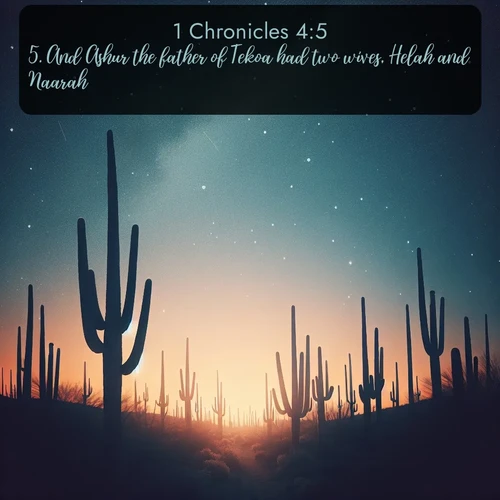1 Chronicles 4:5 plusieurs versions / traductions
English Bible Translations
5. And Ashhur, the father of Tekoa, had two wives, Helah and Naarah.
German Bible Translations
5. Und Aschchur, der Vater von Tekoa, hatte zwei Frauen, Chela und Naara.
French Bible Translations
Versions with Strong Codes
1 Chronicles 4 / KJV_Strong5. And Ashur[H806] the father[H1] of Tekoa[H8620] had[H1961] two[H8147] wives,[H802] Helah[H2458] and Naarah.[H5292]
Strong Code definitions
H806 'Ashchuwr ash-khoor' probably from H7835; black; Ashchur, an Israelite:--Ashur. see H7835
H1 'ab awb a primitive word; father, in a literal and immediate, or figurative and remote application):--chief,(fore-)father(-less), X patrimony, principal. Compare names in "Abi-".
H8620 Tqowa` tek-o'-ah a form of H8619; Tekoa, a place in Palestine:--Tekoa, Tekoah.see H8619
H1961 hayah haw-yaw a primitive root (compare 1933); to exist, i.e. be or become, come to pass (always emphatic, and not a mere copula or auxiliary):--beacon, X altogether, be(-come), accomplished, committed, like), break, cause, come (to pass), do, faint, fall, + follow, happen, X have, last, pertain, quit(one-)self, require, X use. see H1933
H8147 shnayim shen-ah'-yim dual of H8145; feminine shttayim {shet-tah'-yim}; two; also twelfth, + twelve, + twenty (sixscore) thousand, twice, two. see H8145
H802 'ishshah ish-shaw' feminine of H376 or 582; irregular plural, nashiym{naw-sheem'}; a woman (used in the same wide sense as H582):--(adulter)ess, each, every, female, X many, + none, one, + together, wife, woman. Often unexpressed in English. see H376see H582&volume=KJV_strong' target='_self' >H582 see H582&volume=KJV_strong' target='_self' >H582
H2458 Chel'ah khel-aw' the same as H2457; Chelah, an Israelitess:--Helah. see H2457
H5292 Na`arah nah-ar-aw' the same as H5291; Naarah, the name of an Israelitess, and of a place in Palestine:--Naarah, Naarath.see H5291
Prédications qui analysent les thèmes 1 Chroniques 4
Thèmes : Les descendants de Juda; Lignée de Caleb; Autres familles de JudaRelated Sermons discussing 1 Chronicles 4
Themes : Les descendants de Juda; Lignée de Caleb; Autres familles de Judasee also: Bible Key Verses ; KJV Bible Images, BBE Bible images

